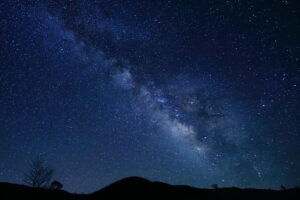
Credit: skyseeker via Flickr
Our first night living miles away from downtown’s bright lights, I went outside, looked up, and felt a deep contentment wrap around me. I was used to a night sky that looked like a black shoebox with a few holes punched. This looked like diamonds sewn onto layers and layers of tulle, so even the farthest stars shone through faintly. We were so excited, we bought a telescope, but it was cheap and complicated and we never got it set just right.
Years passed. Always, when I let the dog out for the last time before bed, I looked up. But over time, a milky wash—what environmentalists curse as “skyglow”—made it harder to see the stars. They remained a gorgeous blur to me; I had yet to locate anything beyond Venus and the Big Dipper.
“I’ll show you,” promises Dr. Sus Barker, a friend who is a naturalist and science teacher. “Winter’s the best time for stargazing.” She makes cocoa, I bring marshmallows, and we drive to a marshy spot at the edge of the woods.
And there they are. The same constellations the ancient Greeks stared at, and people on the other side of the world stare at, and future generations will stare at—if they can find a place dark enough. Sus shows me the bright row of stars in Orion’s belt, and suddenly I can see the hunter’s outline, club in one hand, shield in the other. She points with a strong flashlight she covered in red cellophane to preserve our night vision: “See his faithful hunting dogs? Canis Major and Canis Minor are right down there, at his heel as they chase Lepus, the rabbit, across the night sky.”
This is called star hopping, she says. You find one constellation and use it to hop to another. From the belt of Orion, you can extend a line over to the Big Dog star, Sirius. “Now, see the Big Dipper?”
I nod eagerly.
“The stars at the tip of the ladle also point toward Polaris,” the star T.S. Eliot could have been talking about when he wrote “the still point of the turning world.” Polaris is fixed, and the circumpolar constellations—both Dippers, Draco the Dragon, Cepheus, and Cassiopeia, circle around it every night. “Polaris is the North Star,” Sus continues. “For slaves in the South, the dipper—also called ‘the drinking gourd’—pointed the way toward northern states and freedom.”
She arcs the flashlight back to Orion’s belt, then drops the beam down to the sword, shining on the fainter second-to-last star. “That’s a nebula, a cloud of gas and dust where stars are born.” She turns. “See that big cloudy band? That’s the Milky Way. Somewhere in the middle, there’s a black hole, a place where a large star dies and collapses inwardly. Gravity is so strong there, not even light escapes. One teaspoon of dark matter weighs thousands of tons.”
She shows me how to face east, stretch out my arms to the side, and bend the left arm at the elbow. It is now pointing north, toward the circumpolar stars. Gazing up, I get that fathomless feeling, a sort of vertigo, as though I will float up and into the sky. For Sus, the night sky has the opposite effect, steadying her with its constancy.
We lean against the car’s hood, feel the freezing metal through our jackets. The air is so thin and cold, you could fold it with a sharp crease. Clutching a star chart, I find other constellations. I fall in love with the Pleiades, middle-aged, hot blue stars that are easy to see in winter. They show up in the Bible, the Quran, Homer’s Iliad and Odyssey … Astronomers call them the Seven Sisters; it is easy to see that they are related, because they move at the same speed, in the same direction, across the sky.
When I get home, I look up—and can barely see my sisters. I am so sad, I am angry, ready to call the mayor and beg for an injunction to keep people’s porch lights off after 10 pm. More than 300 million streetlamps blaze from Earth, as do lit buildings, signs, floodlights, headlights. In cities, on cloudy nights when the skyglow is reflected back, the night sky is a thousand times brighter than it would be naturally.
This is messing up more than amateur stargazing.
Daytime animals now forage well into the night, putting nocturnal animals at a disadvantage. Birds start singing in the wee hours. Antelope have started to roam at night. It is harder and harder for a firefly to attract a mate. Wallabies are delaying childbirth. Flowers under streetlamps receive fewer visits by nocturnal pollinators. Sparrows living with light pollution carry West Nile virus two days longer, increasing contagion. Night-flying moths are losing their extraordinary ability to navigate by the stars, as is the dung beetle, a creature far more glamorous when you learn that its GPS is the Milky Way.
One third of all human beings on the planet can no longer even see the Milky Way.
Since 2012, light emissions have risen 2.2 percent a year on average, and in some places by 20 percent. We forget to use light fixtures that shine the light down rather than dispersing it. Our LEDs are full of easily scattered blue wavelengths, the least friendly to wildlife. But they are cheap and extra-bright, and we just keep installing them. Instinctively, we equate light with safety, productivity, attraction, entertainment, and the energy of prosperity. We are scared of the dark.
And so we miss the stars.
